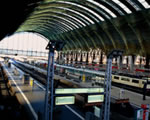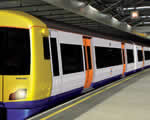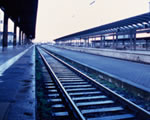 Go to main content
Go to main content
Archive Website of the UK government
Please note that this website has a UK government accesskeys system.
Main menu
Page menu
Travel and transport

Rail services in Great Britain

Different organisations are responsible for the running and safety of Britain's railways and train services. Find out who is responsible for running the trains, managing stations, maintaining track and signals and the safety of the railways.
Running train services
Train companies are responsible for:
- running the trains on their routes
- managing the stations on their routes – although some stations are managed by Network Rail and some are run by more than one company
- setting fares, station car-park charges and, with Network Rail, service timetables
What the government is responsible for
The Department for Transport (DfT) and Transport Scotland sell 'franchises' to train operators to run train services. A franchise is a contract between the train company and the government. The contract sets outs the requirements that the company must meet, including:
- setting the minimum number of services that the company must run
- giving passengers information about train times and services, including when trains are delayed or cancelled
- providing safe, clean and reliable journeys for passengers
The franchise agreements between the train companies and the government are available on the DfT website. You can check the National Rail Enquiries website for contact details for each train company and a list of station operators.
Setting fares
Some standard-class fares are monitored by the government as part of franchise agreements. These fares are called 'regulated fares' and are usually commuter tickets for travel at peak times. The government sets how much the train companies can raise the price of these fares.
For more information about how fares are regulated by the government, contact either:
- Merseytravel PTE (for Merseyrail Electrics)
- Transport for London (for London Overground)
- Transport Scotland (for First ScotRail)
- the business, enterprise, technology and science division of the Welsh Assembly Government (for Arriva Trains Wales)
- the Department for Transport (for all other train companies)
Your rights and responsibilities when using train services
Under their franchise agreement, each train company has to have and publish a passenger's charter. This charter sets out the level of service that passengers can expect on their rail journey. For information the service you can expect and your rights and responsibilities as a passenger, follow the link below.
Getting the best deal for rail passengers
Passenger Focus is an independent consumer watchdog that aims to get the best deal for rail passengers. London Travelwatch works in the same way for passengers on rail journeys through London.
If you complain to a train company about their service and you're unhappy with their response, these organisations can follow it up for you.
See 'Making a complaint about rail services' for more information.
Maintaining track and signals
Network Rail is responsible for the management of rail infrastructure in Great Britain. This includes things like:
- maintaining the safety and quality of the tracks and bridges, carrying out engineering work and setting speed restrictions
- looking after fences and plants alongside the tracks
- monitoring noise and vibration, pollution and graffiti
Engineering works and changes to services
Network Rail carries out the engineering work on the tracks, but the train company is responsible for providing information about any changes to services. You should see notices outlining planned engineering works at stations or advertised locally. You can also check for disruptions on the National Rail Enquiries website or phone their enquiry line on 08457 48 49 50.
Monitoring the safety of the railways
The safety of the railways in Britain is monitored by the Office of Rail Regulation (ORR). ORR is independent of the railway industry and government and responsible for making sure that:
- Network Rail manages the railway network efficiently and safely
- all organisations working on the railways follow health and safety law
For more information, follow the link below.
Investigating rail accidents
ORR also works with the Rail Accident Investigation Branch (RAIB) to investigate accidents on the UK's railways. The RAIB is the independent railway accident investigation organisation for the UK.
By law, the RAIB must investigate all rail accidents involving a derailment or collision which resulted in, or could have resulted in:
- the death of at least one person
- serious injury to five or more people
- extensive damage to rolling stock (train carriages), the rail infrastructure or the environment
The findings of the RAIB's investigations into accidents are on the RAIB website.
Safety and security on trains and at stations
The British Transport Police (BTP) is the national police force for the railways. They work to protect the safety of railway staff and passengers throughout England, Wales and Scotland.
For information about keeping safe when using rail services, see 'Rail passenger safety'.
More useful links
Useful contacts
Additional links
Travelling on a bank holiday?

Some operators run reduced or Sunday services on bank holidays - and you may need to book in advance for popular routes
Simpler, Clearer, Faster

From 17 October, GOV.UK will be the best place to find government services and information
 Facebook
Facebook Twitter
Twitter StumbleUpon
StumbleUpon Delicious
Delicious Reddit
Reddit